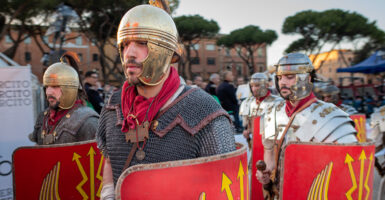Last week, my wife asked me, “How often do you think about the Roman Empire?”
Her question didn’t come out of nowhere. TikTok might be a minefield of Chinese cyberthreats, but it has birthed a trend in which women ask men how often they contemplate the glory that was Rome. The trend took off because wives were surprised to hear their husbands say they think about the Roman Empire every day or a number of times a week.
I told my wife I probably think about the Roman Empire once a day, and I understand why my fellow men gladly confess that we’re obsessed with the creation of Caesar Augustus.
I studied Latin for years in middle school, high school, and college, so I may think about the Roman Empire more than my fellow men, but I think I can help shine light on ancient Rome’s appeal for a modern audience.
Naturally, historians told The New York Times and The Washington Post that men think about the Roman Empire in part because ancient Rome was rather patriarchal.
Kevin Feeney, a faculty fellow at New York University who teaches an introductory class on Roman history, told The New York Times that ancient Roman society was “extremely, extremely patriarchal.” He estimated that enrollment in his class is about 60% male.
“Ancient Rome was, of course, patriarchal and violent,” Lewis Webb, a historian of ancient Rome at Oxford University, told The Washington Post. “But it was also a diverse place: There were numerous forms of masculinity, women could have agency and power, and there were multiple gender expressions and identities, as well as various sexualities.”
In elite Roman society, men did have ultimate social power. The paterfamilias (father of the family) infamously had the authority of life and death over others in the household. Of course, that didn’t translate to very much power for his sons. Scholars often note that the lower classes were more egalitarian between the sexes.
Yet, modern men aren’t secretly pining for the “good old days,” when women supposedly had to do whatever we asked. We aren’t looking to turn back the clock.
Modern men don’t want to go back to a time when many of them would have been slaves, when they would have drunk large amounts of lead in the water transferred by aqueducts, and when they had to wait for snow from the mountains if they wanted a cold drink.
We know that life wasn’t exactly hunky-dory in first-century Rome, where tenements built too close together often went down in flames, and oppressed people, such as the Jews, faced extermination when they raised concerns about high taxes.
No, the reason we think so much about Rome has a lot more to do with its glory, the expansion of its empire, and the tremendous impact it had on Western civilization.
Hollywood keeps returning to the Roman Empire for a reason.
So many films about ancient Rome have left a lasting impression on me, from “Ben-Hur” (1959) to “Cleopatra” (1963) to “Gladiator” (2000) to “Spartacus” (both the 1960 film and the 2010-2013 television series). Men who have watched any one of these historic films have a visceral understanding of “the glory of Rome,” the military might that conquered the Mediterranean world and the order Rome imposed upon it through brute force.
Men need not pine for the days of Rome to admire the masculinity of leaders, such as Julius Caesar and Scipio Africanus. Historians, teachers, and filmmakers present Roman men as the noble exemplars of masculinity (even if the truth may have been more complicated), and we naturally look up to them. Who among us doesn’t want to stand tall like Russell Crowe’s Maximus in “Gladiator,” proclaiming bold truths in the face of the emperor?
I have also had the pleasure of visiting some of the great monuments of Rome, from the Coliseum to the Roman Forum to the fantastic ruins at Pompeii, Herculaneum, and Ephesus. What kind of civilization could build these cities and monuments that lasted thousands of years?
These films and these ruins breathe life into an ancient civilization whose western half officially collapsed more than 1,500 years ago. They testify about a warlike people who nonetheless pioneered many of the inventions that bring order to our lives today—from official roads measured in miles to aqueducts that provided running water to a flourishing literary scene that preserved so much knowledge for posterity.
Of course, any mention of these marvels just skims the surface of Rome’s tremendous impact on the modern world. The American Founders intently studied Roman history—along with that of the Greek city-states and the later Italian city-states—when crafting the Declaration of Independence and the Constitution. Architects have consciously echoed Roman designs for millennia. The ancient Roman poet-philosopher Lucretius inspired many ideas in science, such as the idea that all matter is made up of atoms.
Slave rebellions throughout history took inspiration from the doomed gladiator-turned-freedom fighter Spartacus. (Even Sen. Cory Booker, D-N.J., echoed Spartacus on the Senate floor, albeit rather poorly.)
Of course, the Romans were infamously brutal—though the Assyrians gave them a run for their money. Rome expanded by conquest, and the legions weren’t exactly nice about it. This wasn’t new for the ancient world: From the days of Akkad to rulers like Rameses II, Nebuchadnezzar, Cyrus, and Alexander the Great, empires spread by conquest, leaving death, destruction, and slavery in their wake.
Woe to the city that refused to pay tribute.
While the Assyrians distinguished themselves by impaling people on stakes, the Romans invented a new form of torturous execution; you might say it was excruciating. Before the cross became a religious symbol, the Romans used it to kill their slaves and enemies. They hung the victims up, naked, in a position that slowly suffocated them. They perfected a recipe for embarrassment, pain, and despair.
In this context, an obscure carpenter from Nazareth, born in the early days of the Roman Empire, launched a new faith that dominated the world. The message of Jesus Christ spread on Roman roads, on the lips of an apostle who proudly identified himself as a Roman citizen, and to the very heart of the empire.
The Roman Catholic Church has transformed the Roman Empire’s influence time and time again. Catholic priests brought Christianity to the far reaches of the empire, like Britain and Germany. The pope crowned the Holy Roman Emperor and Napoleon Bonaparte, who set himself up as a modern version of the Roman emperors. The Catholic Church fostered the first universities, sent missionaries throughout the world, and preserved much ancient knowledge.
As a Protestant, I admire very much about the Catholic Church without embracing all its tenets. I have memorized the “Our Father” in Latin, and I love reading the Vulgate. While I remain skeptical of many Catholic claims, I have long thought Protestants too often dismiss the contributions of our Roman Catholic brethren.
Rome’s influences are not all positive. Christians must never forget that Romans put the early martyrs to death in the Coliseum. Rome’s engines of war required a steady fuel of conquest, slavery, and exploitation.
Many of us think about the Roman Empire in the context of its decline and fall. Many of the warning signs that Rome was about to fall—unfettered migration, decadent elites, high national debt, the very “multiple gender expressions and identities” that historian Webb mentioned—have strong echoes in our own time.
The United States isn’t exactly an empire, but it seems to have the same problems Rome faced, and ancient Roman premonitions of doom did ultimately come to pass. Many of the men who think about Rome once a day are wondering whether the U.S. will go the way of ancient Rome and are hoping to find ways to prevent that.
Sure, Rome isn’t the only ancient empire Americans should consider. We should also think about the Athenian Empire, the Achaemenid Persian Empire (which arguably created the idea of religious freedom and paid to restore the Jewish Temple under Cyrus), the empires that popped up after Alexander the Great’s conquest (particularly the Seleucid Empire that oppressed the Jews and inspired the Maccabean Revolt), the Aztec and Incan empires, and more.
I’m a history buff, so I’m interested in more empires than most, but those five are a great start for those interested in empires other than Rome.
Perhaps the more salient question isn’t “Why do you think about the Roman Empire daily?” but rather, “How could you not?”
Have an opinion about this article? To sound off, please email letters@DailySignal.com, and we’ll consider publishing your edited remarks in our regular “We Hear You” feature. Remember to include the URL or headline of the article plus your name and town and/or state.





























